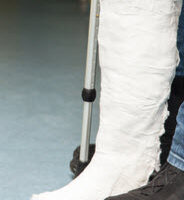Understanding the Collateral Source Rule

Florida law does not allow negligent parties to pay less in damages simply because a third party has already compensated the injured person. Under the collateral source rule, health insurance payments and similar sources of compensation do not affect the defendant’s liability. That’s why courts generally do not admit evidence of the plaintiff’s health insurance. In other words, if the plaintiff is reimbursed by his insurance company, the defendant can still be held liable for the full extent of the plaintiff’s damages.
The rationale behind this rule is that health insurance benefits are earned and paid for by the recipient. The law does not want to punish people for taking responsibility for their own health care.
Other collateral sources of compensation include:
- Automobile accident insurance that provides health benefits or income disability coverage;
- Social Security payments; and
- Contractual wage continuation plan provided by an employer.
If you pay for the right to be reimbursed, then courts will not use those payments to lessen the amount that the defendant owes you in damages.
Exception to the Collateral Source Rule
Free or low-cost secondary source benefits, like Medicare and Medicaid, are generally not protected under the collateral source rule. The rationale here is that Medicare and Medicaid benefits are free and unearned. Courts therefore have considered Medicare and Medicaid payments to determine the plaintiff’s need for future medical expenses.
But the Florida Supreme Court considered this exception in a 2015 case involving a disabled adult who had never worked and received Medicare benefits. This man was hit by a car while riding a bike in 2007. He ultimately sued his own insurer for uninsured motorist benefits.
The trial court excluded evidence of any future benefits he might receive under Medicare or Medicaid, and ultimately awarded him $1.5 million in damages, including $470,000 for future medical expenses. The appeals court reversed the future damages award, holding that the lower court should have admitted evidence of the free Medicare benefits.
The injured plaintiff appealed the issue to the Florida Supreme Court, which held that the Medicare benefits should not be admitted as evidence because these benefits are based on public funding and congressional action and therefore are not guaranteed.
Two Types of Damages
Remember that the compensation awarded in personal injury cases is called “damages,” and there are two types in Florida: compensatory and punitive.
Compensatory damages are exactly what they sound like: an amount that’s intended to compensate the victim for his or her loss. Punitive damages are also exactly what they sound like: an amount that’s intended to punish the offender for his or her behavior.
Contact Us Today
Contact a West Palm Beach personal injury attorney at The Pendas Law Firm today for a free consultation if you were injured because of someone else’s negligence. Our experienced attorneys will help recover the compensation that you are entitled to, whether or not you also received compensation from a secondary source.
The Pendas Law Firm also represents clients in the Orlando, Jacksonville, Fort Myers, Fort Lauderdale, Miami, Tampa, Daytona Beach and Bradenton areas.
Resource:
leg.state.fl.us/statutes/index.cfm?App_mode=Display_Statute&URL=0700-0799/0768/Sections/0768.76.html
floridasupremecourt.org/decisions/2015/sc13-1768.pdf






